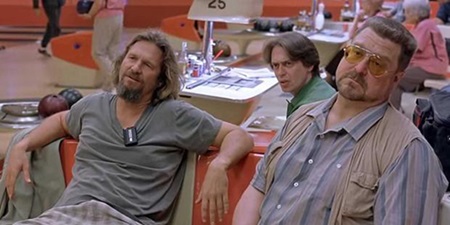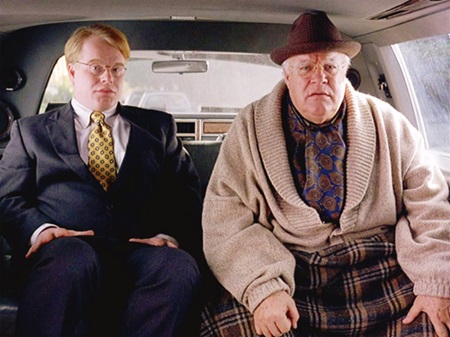Joel Coen and Ethan Coen were inspired by the work of Raymond Chandler to write and direct the movie The Big Lebowski (1998). As older brother Joel Coen was quoted in an archived article of IndieWire referenced here, the Coen Brothers “wanted to do a Chandler kind of story – how it moves episodically, and deals with the characters trying to unravel a mystery, as well as having a hopelessly complex plot that’s ultimately unimportant.”

Slacker and bowler Jeffrey ‘The Dude’ Lebowski, as portrayed by Jeff Bridges, opens The Big Lebowski as the victim of a crime in his own Los Angeles, California home. Pornography magnate Jackie Treehorn, as portrayed by Ben Gazzara, sends two enforcers after Lebowski to collect on the debts incurred by what the enforcers believe is the Dude’s wife. It’s only after harassing the Dude and damaging his property that the enforcers realize they’ve found the wrong Jeffrey Lebowski.

The appropriate man is, of course, Jeffrey ‘The Big’ Lebowski as portrayed by David Huddleston. After discussing the matter with bowling buddies Walter Sobchak and Theodore Donald ‘Donny’ Kerabatsos, as portrayed by John Goodman and Steve Buscemi respectively, the Dude confronts the Big at the Big’s mansion. The affluent Jeffrey abusively dismisses his slacker namesake in response to a request for restitution. Before encountering Bunny Lebowski as portrayed by Tara Reid when departing the mansion, the Dude uses trickery to convince Brandt as portrayed by Philip Seymour Hoffman to allow him, that is Dude, to take property from the mansion as recompense for the Dude’s trouble.

Extending the comedy of absurdity further, Bunny is soon considered kidnapped. The affluent Lebowski hires the Dude to rectify that situation with a briefcase reportedly full of money. Franz, Uli Kunkel and Kieffer, as portrayed by Torsten Voges, Peter Stormare and Flea retrieve the property taken by the Dude owing to the fond feelings that Maude Lebowski, as portrayed by Julianne Moore, has for that property.

In addressing the supposed kidnapping, absurd craziness ensues at the behest of Jeffrey ‘the Big’ Lebowski through the hands of Walter Sobchak. The exchange of money for the life goes horribly wrong, with the money getting stolen at the bowling alley later that night. As the comically absurd sequence extends further, we encounter Jesus Quintana as portrayed by John Turturro and The Stranger as portrayed by Sam Elliott for commentaries regarding different aspects of the story that unravels in front of us. The insinuation of Maude Lebowski at seemingly odd times and in bold ways through the unfolding of the mystery adds to the theatre of comedy that this movie presents.

Through the episodic and humorously explicit charm of the wild scenes of the movie, the expressively lighthearted way the Dude abides the comedy of what happens around him proves to be the charm that makes the movie work. Jeff Bridges really pulls off the feel good comedy of that part with skill. I grant The Big Lebowski as written and directed by the Coen Brothers 4.0-stars on a scale of 1-to-5.
Matt – Wednesday, November 29, 2023
